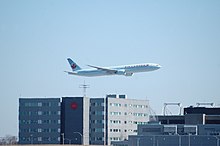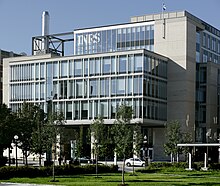Our website is made possible by displaying online advertisements to our visitors.
Please consider supporting us by disabling your ad blocker.
Economy of Quebec
| Currency | Canadian dollar (CAD) |
|---|---|
| April 1 to March 31 | |
Trade organisations | CUSMA, OECD, |
| Statistics | |
| GDP | CAD$ 504,5B (2021)[3] |
GDP per capita | CAD$ 52,384 (2018)[3] |
| 6.2% (January 2023) | |
Population below poverty line | 6.4% (2020) |
| Unemployment | 6.3% (2021)[3] |
| External | |
| Exports | C$ 223,3B (2021) goods: 75.7 % services: 24.3 % international: 61,3 % % interprovincial: 38,7 % |
Export goods | aluminium airplanes paper airplane parts copper and alloys |
Main export partners | United States (72.2%) United Kingdom (2.6 %) Germany (2.0 %) France (1.9 %) Netherlands (1.8 %) |
| Imports | C$ 234,7B (2021) goods: 75.5 % services: 24.5 % international: 66,3 % interprovincial: 33,7 % |
Import goods | petrol automobiles airplanes trucks and frames |
Main import partners | United States (31.1 %) China (8.3 %) Algeria (8.1 %) United Kingdom (7.9 %) Germany (4.0 %) Japan (4.0 %) |
| Public finances | |
| $219.0 billion CAD(2021)[4] | |
All values, unless otherwise stated, are in US dollars. | |


The economy of Quebec is diversified and post-industrial with an average potential for growth.[5] It is highly integrated with the economies of the rest of Canada and the United States. Manufacturing and service sectors dominate the economy.[6]
The economic heart of Quebec is the Montreal metropolitan area where half of Quebecers live. This region alone accounts for 53.4% of the province's gross domestic product (GDP), followed by the Quebec City metropolitan area (11.4%), Gatineau (3.2%), Sherbrooke (2.2%), Saguenay (1.9%) and Trois-Rivières (1.8%). In total, Quebec's GDP at market prices was CAD 381 billion or 19% of Canada's GDP.
For 2022-23, Quebec's budget was C$22 billion. This budget planned to provide $8,9 billion more to the healthcare sector over 5 years.[7][8] Like most industrialized countries, the economy of Quebec is based mainly on the services sector. Quebec's economy has traditionally been fuelled by abundant natural resources, well-developed infrastructure, and average productivity. The provincial GDP in 2021 was C$504,5 billion,[9] making Quebec the second largest economy in Canada after Ontario.
The provincial debt-to-GDP ratio peaked at 50.7% in fiscal year 2012–2013, is now resting at 38.1 in 2022,[10] and is projected to decline to 34% in 2023–2024.[11] The credit rating of Quebec is currently Aa2 according to the Moody's agency.[12] In June 2017, Standard & Poor's (S&P) rated Quebec as an AA− credit risk, surpassing Ontario for the first time.[13]

Quebec's economy has undergone tremendous changes.[14] Firmly grounded in the knowledge economy, Quebec has one of the highest growth rate of GDP in Canada. The knowledge sector represents about 31% of Quebec's GDP.[15] In 2011, Quebec experienced faster growth of its research-and-development (R&D) spending than other Canadian provinces.[16] Quebec's spending in R&D in 2021 was equal to C$4.1B or, above the European Union average of 1.8%.[17] The percentage spent on research and technology is the highest in Canada and higher than the averages for the Organisation for Economic Co-operation and Development and G7 countries.[18] Approximately 1.1 million Quebecers work in the field of science and technology.[19]
- ^ ISQ. "Comparaisons économiques internationales Archived 2009-08-31 at the Wayback Machine" - "Profils économiques par pays et territoire Archived 2009-08-24 at the Wayback Machine" and "Tableaux comparatifs par indicateur Archived 2006-12-29 at the Wayback Machine", 2009-07-07.
- ^ ISQ. Le Québec chiffres en main, édition 2009 Archived 2011-05-15 at the Wayback Machine, Québec, Institut de la statistique du Québec, 2009, retrieved May 17, 2009.
- ^ a b c ISQ. "[1], Québec, Institut de la statistique du Québec, 2023, retrieved February 23, 2023
- ^ ISQ. "[2] Québec, Institut de la statistique du Québec, 2021, retrieved February 23, 2023
- ^ Scofield, Heather (2009). "Few bumps in la belle province's recession ride". Globe and Mail.[permanent dead link]
- ^ "Institut de la statistique du Québec" (PDF). Gouvernement du Québec. 3 October 2010. Archived from the original (PDF) on 4 November 2010.
- ^ "Budget"
- ^ "Québec dépose son budget"
- ^ Statistics Canada (4 November 2010). "Gross domestic product, expenditure-based, by province and territory". Government of Canada. Archived from the original on 15 January 2011. Retrieved 23 February 2011.
- ^ "Net debt of governments in Canada as at March 31, 2022". Retrieved 23 February 2023.
- ^ "Canadian Federal and Provincial Fiscal Tables" (PDF). Economic Reports. Royal Bank of Canada. 14 January 2020. Retrieved 18 January 2020.
- ^ "Dette: le Québec, cancre d'une classe surdouée". Cyberpresse. Archived from the original on 12 August 2011. Retrieved 29 July 2011.
- ^ "Quebec credit rating surpasses Ontario for first time ever". canoe.com. Postmedia. 16 June 2017. Archived from the original on 21 June 2017. Retrieved 17 June 2017.
- ^ "Perspective revue d'analyse économique" (PDF). caisse desjardins. Retrieved 23 June 2011.
- ^ "Le Québec : une économie dynamique" (PDF) (in French). Government of Quebec. Archived from the original (PDF) on 6 July 2011. Retrieved 23 February 2011.
- ^ "L'expertise québécoise en haute technologie". Investissement Québec. Archived from the original on 27 May 2011. Retrieved 23 June 2011.
- ^ Sauvé, Mathieu-Robert (19 May 2010). "Une cible de 3% pour la science" (in French). LeDevoir online newspaper. Archived from the original on 8 August 2011. Retrieved 11 July 2011.
- ^ Le Cours, Rudy (30 July 2010). "L'économie du savoir en mutation au Québec" (in French). La Presse Affaire, Cyberpresse. Archived from the original on 30 July 2010. Retrieved 11 July 2011.
- ^ Investissement Québec. "The Benefits of Investing in Québec Research & Development". IQ Investquebec. Archived from the original on 27 May 2011. Retrieved 23 February 2011.
Previous Page Next Page


